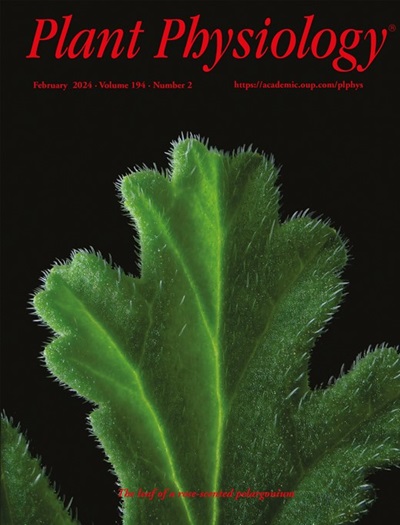A hierarchical ubiquitination-mediated regulatory module controls bamboo lignin biosynthesis
IF 6.5
1区 生物学
Q1 PLANT SCIENCES
引用次数: 0
Abstract
The lignocellulosic feedstock of woody bamboo shows promising potential as an alternative to conventional wood, attributed to its excellent properties. The content and distribution of lignin serve as the foundation of these properties. While the regulation of lignin biosynthesis in bamboo has been extensively studied at the transcriptional level, its posttranslational control has remained poorly understood. This study provides a ubiquitinome dataset for moso bamboo (Phyllostachys edulis), identifying 13015 ubiquitinated sites in 4849 unique proteins. We further identified Kelch repeat F-boxprotein 9 (PeKFB9) that plays a negative role in lignin biosynthesis. Heterologous expression of PeKFB9 resulted in reduced accumulation of lignin and decreased phenylalanine ammonia-lyase (PAL) activities. Both in vitro and in vivo assays identified interaction between PeKFB9 and PePAL10. Further examination revealed that SCFPeKFB9 mediated the ubiquitination and degradation of PePAL10 via the 26S proteasome pathway. Moreover, PebZIP28667 could bind to the PePAL10 promoter to significantly inhibit its transcription, and ubiquitination of PebZIP28667 weakened this inhibition. Collectively, our findings reveal a PeKFB9-PePAL10/PebZIP28667-PePAL10 module that acts as a negative regulator of lignin biosynthesis. This study advances our understanding of posttranslational regulation in plant lignification, which will facilitate the improvement of the properties of bamboo wood and the breeding of varieties.分层泛素化介导的调控模块控制着竹子木质素的生物合成
木竹的木质纤维素原料因其优异的特性,显示出替代传统木材的巨大潜力。木质素的含量和分布是这些特性的基础。虽然在转录水平上对竹子木质素生物合成的调控进行了广泛研究,但对其翻译后调控仍知之甚少。本研究提供了毛竹(Phyllostachys edulis)泛素组数据集,确定了 4849 个独特蛋白质中的 13015 个泛素化位点。我们进一步鉴定了在木质素生物合成中起负作用的 Kelch 重复 F-boxprotein 9(PeKFB9)。异源表达 PeKFB9 可减少木质素的积累并降低苯丙氨酸氨解酶(PAL)的活性。体外和体内试验都发现了 PeKFB9 和 PePAL10 之间的相互作用。进一步研究发现,SCFPeKFB9 通过 26S 蛋白酶体途径介导了 PePAL10 的泛素化和降解。此外,PebZIP28667可与PePAL10启动子结合,显著抑制其转录,而PebZIP28667的泛素化则削弱了这种抑制作用。总之,我们的研究结果揭示了一个 PeKFB9-PePAL10/PebZIP28667-PePAL10 模块,它是木质素生物合成的负调控因子。这项研究加深了我们对植物木质素化的翻译后调控的理解,这将有助于改善竹材的特性和培育竹材品种。
本文章由计算机程序翻译,如有差异,请以英文原文为准。
求助全文
约1分钟内获得全文
求助全文
来源期刊

Plant Physiology
生物-植物科学
CiteScore
12.20
自引率
5.40%
发文量
535
审稿时长
2.3 months
期刊介绍:
Plant Physiology® is a distinguished and highly respected journal with a rich history dating back to its establishment in 1926. It stands as a leading international publication in the field of plant biology, covering a comprehensive range of topics from the molecular and structural aspects of plant life to systems biology and ecophysiology. Recognized as the most highly cited journal in plant sciences, Plant Physiology® is a testament to its commitment to excellence and the dissemination of groundbreaking research.
As the official publication of the American Society of Plant Biologists, Plant Physiology® upholds rigorous peer-review standards, ensuring that the scientific community receives the highest quality research. The journal releases 12 issues annually, providing a steady stream of new findings and insights to its readership.
 求助内容:
求助内容: 应助结果提醒方式:
应助结果提醒方式:


